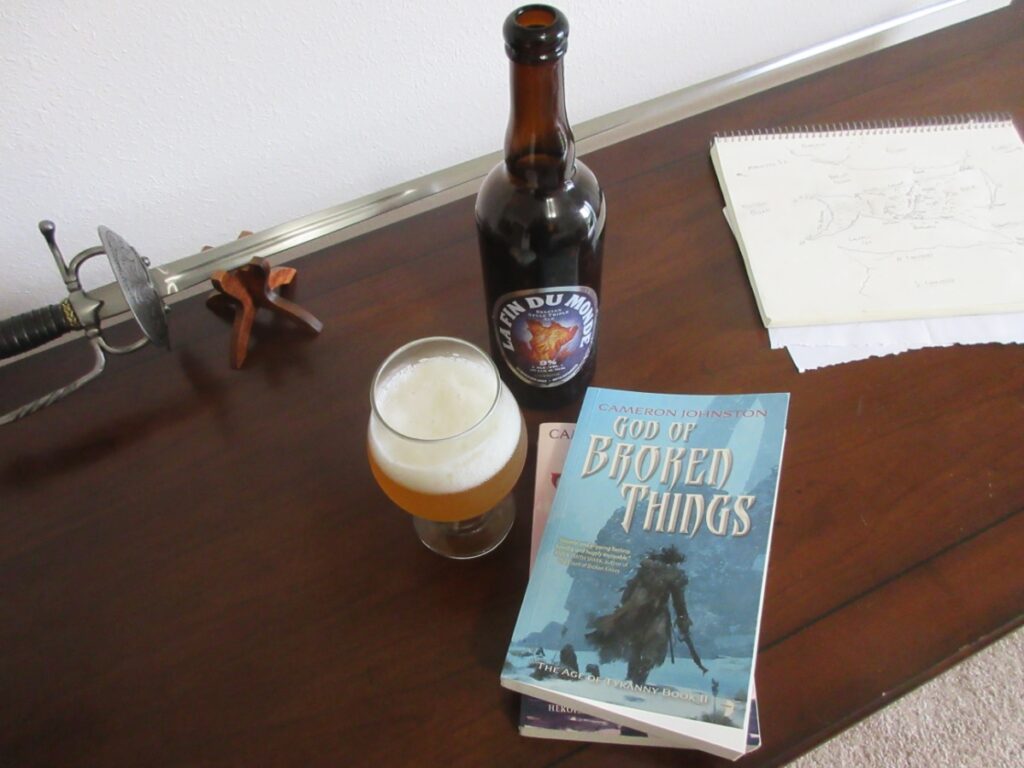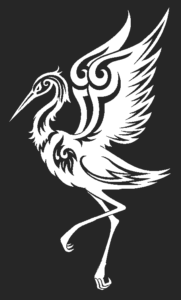God of Broken Things by Cameron Johnston
 This beer’s got so much head I wonder if Walker’s warging into it…
This beer’s got so much head I wonder if Walker’s warging into it…
I recently finished Cameron Johnston’s The Traitor God just in time for the second installment, God of Broken Things, to come out. I broke my personal rule not to pre-order things, though that’s mainly for games (looking at you Thi4f!) but it worked out well in this case. Book #2 concludes the story of Edrin Walker in an explosive way. Yep, it’s actually not a trilogy for once.
We begin a couple months after the near-destruction of the city Setharis, and the alien parasite Scarrabus are still infesting certain powerful mages in their scheme to take over. Having saved everyone and killed yet another god in the process, Walker’s been given a reprieve, and must hunt them down. This quickly gives way to a new crisis when an army of Skallgrim warriors enthralled to the invaders begins a march to destroy them. Walker leads a handful of mages who hate him and a hand-picked band of killers and criminals to confront the enemy in a harsh mountain land, where he confronts a few demons from his past, and the real existential scale of the struggle is revealed.
The nice thing about subsequent books in any series is the lack of need for world-building from scratch. The world, characters, and central conceits of the story are already familiar, so we can dive right into the plot. Johnston takes full advantage of this, and the story picks up in what could be the next chapter of the first book. There is still lots of telling though, with several long paragraphs of exposition that could have been more impactful through action. This volume is a slim 312 pages, so there was ample space to do this. I will say that I liked the development of military tactics to incorporate mages, with units formed in a way reminiscent of carrier battle groups.
In this book, the Lovecraftian elements that were set up previously are paid off and then some. It was only at the end of The Traitor God that the true enemies were revealed, and now we are treated, in a few gestalten revelations, to the full cosmic horror of the real fight that our heroes and antiheroes are waging. This perfectly justifies the excessive blood and death that takes place—they’re literally fighting for the universe. This is where Walker’s psychic abilities really take flight, crossing not just minds and distances but whole dimensions. It’s a nice example of taking a given speculative element and stretching it to its utmost in ways the reader never would have expected.
Mirroring this is the slowly unfolding fact that Walker’s internal battle is at least as much of the story. We see him slowly, or not so slowly, succumbing to the siren song of the overpowering magic flowing through his body. The temptation and even the full justification to influence and even completely take over the minds of others without restraint is always present, and he indeed does on several occasions. We get to see his powers unleashed at last, but always with the ever-present danger of being consumed by it. There’s always something that pulls him back from losing his humanity, and the reader never knows when he’ll give in to it. The parallels with addiction are obvious. Walker is wounded and physically weak for much of the book, and I was reminded—and I know this is reaching back a bit—of Moorcock’s Elric, who uses magic to make up for his physical shortcomings, possessed soul-hungry blade included. But I was annoyed more than once by his very uncharacteristic navel-gazing and virtue-signalling. It’s hard to take a character seriously as a grimdark antihero when he’s wringing his iron-infested hands over microaggressions.
The ending is not entirely unexpected. Nor is the ending after that. But it is quite satisfying, and brings the story to its most perfect possible conclusion. I was thinking there wouldn’t be enough time to wrap things up about 30 pages from the end, but I was happy to be proven wrong. For epic stakes such as these, equally epic battles are a given. But when the true fight is also internal, one must expect a fulfilling ending to be as well, and in this God of Broken Things delivers.
Cameron Johnston’s website: CameronJohnston.net
Pairs well with: Unibroue La Fin Du Monde
La Fin Du Monde is a Belgian-style Canadian tripel from Unibroue, and has won several awards. At first I wasn’t sure what to think about this, because although it’s very well balanced it has no single discernible flavor to latch on to, and the character is hard to pin down. It should thus be drunk only slightly cool, otherwise all taste will be lost. After a few sips the raisin flavor comes through without too much sweetness, and a citrus taste that’s not at all like the citrus in IPAs. At 19 IBUs there’s no bitterness. It is highly carbonated though, and has a dangerously light body for its 9% ABV, so enjoy slowly. This beer will have a wide appeal and deservedly so, but for just that reason don’t expect any singular thing to punch out at you. I enjoyed it but I probably won’t long remember it. Still, Walker and the characters in God of Broken Things travel to the ends of the world in order to stop the end of the world, so La Fin Du Monde seems a good match.
